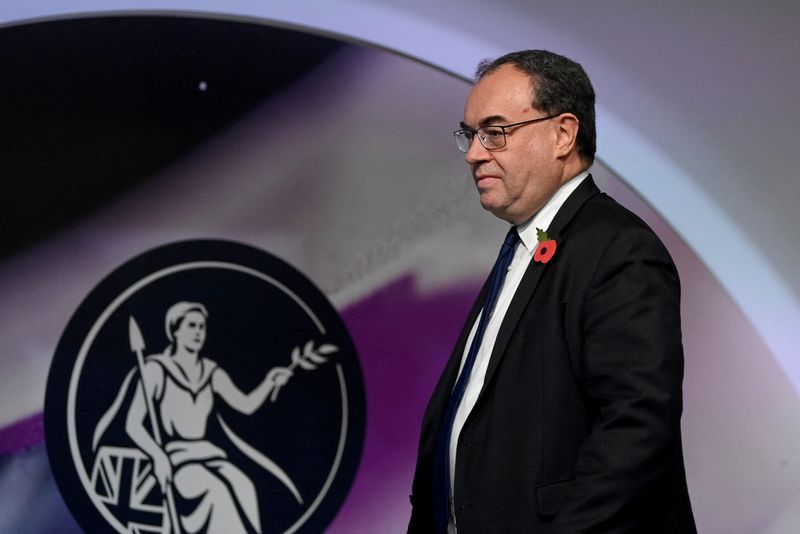By Andy Bruce and David Milliken
LONDON (Reuters) -Bank of England Governor Andrew Bailey on Tuesday pressed home the central bank's opposition to shaking up the way it pays interest on its reserves held by commercial banks, saying that doing so would damage its ability to steer the economy.
Some former BoE officials have said the central bank should alter its system of paying interest to banks on its 950 billion pounds ($1.15 trillion) of reserves, the vast majority of which the BoE issued to finance its quantitative easing programme.
The idea is that reducing the amount of interest paid on reserves - effectively a transfer of public-sector money to commercial banks - would reduce the acute pressure on the public finances at a time of recession and high inflation.
Bailey agreed with comments from BoE Chief Economist Huw Pill, who last week said he was not a fan of the idea.
"In my view, there is not a monetary reason, a monetary policy reason that is, for varying that," Bailey told the Economic Affairs Committee from the House of Lords.
Commercial banks are paid interest on the reserves by the BoE at whatever is the BoE's current interest rate - just 0.1% a year ago, but 3% now and likely to rise further.
The BoE made profits on QE from its government bond purchases when interest rates were low - worth 120 billion pounds over the last decade - which was transferred to the government. But now the BoE makes losses because the interest paid on reserves exceeds income from its QE bond holdings.
Last week official budget forecasters said the government looks on course to send the BoE more than 130 billion pounds over the next six years to cover those losses.
Former BoE deputy governors Paul Tucker and Charles Bean have suggested that the structure of paying for reserves could be altered to reduce these payments, although Bean has said a tax on banks would be a simpler way to do it.
Bailey said the current structure of paying interest fully on all reserves was the simplest way for the BoE to ensure its interest rate changes are transmitted through the financial system.
He disagreed with descriptions that this was free money for banks, since they had their own funding costs to meet that also rose with central bank interest rates.
Another former BoE rate-setter, Gertjan Vlieghe, on Thursday said it would be a "disaster" to stop paying interest on reserves, even partially - akin to a default on debt.
Economists who favour changing the system of reserves remuneration say that unlike with government bonds, there is no established legal or moral expectation that interest should be paid on central bank reserves in a particular way.
